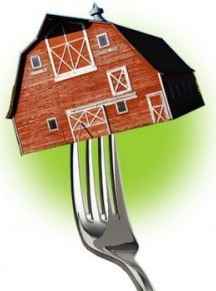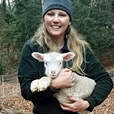
The harvest of the chickens and ducks (30 birds total) was exhausting physically and mentally so I took a little break from all but the most basic outside communication (ie; work). Don’t get me wrong… there are no breaks around here on the farm! Every day it’s early to rise and late to bed because there is always more to do than there is time to do it. I just needed some hermit time to reflect, renew, and finally resolve myself to moving forward with preparations for my next harvest. There are, as always, a lot of things that have to happen between now and November to ensure I’m more efficient at this task.
Farm to Fork - A recap of the Summer 2010 harvest:
I began the process on April 23rd with 16 unmedicated White Muscovy ducklings from J.M. Hatchery in Lancaster County, PA. This hatchery uses improved breeding stock from France that produces males weighing 12 pounds in 12 weeks. I’m happy to report that this is very accurate and the stock was incredibly hardy and healthy. 6 of my ducklings were male. I lost 1 duckling in week 3 when it got out of the brooder unnoticed and couldn’t get back in; I lost 2 females in week 9 when they were attacked by hawks. I selected 1 male (the 2nd largest) and 3 females (the largest, the friendliest, and the prettiest) to keep as breeding stock and the rest were allocated for harvest at the 12 week mark while they’re still young and tender.
When I ordered my Muscovy, I also placed an order for 21 unmedicated Cornish Cross roaster chickens with Meyer Hatchery in Polk, OH. I requested a delivery date 6 weeks prior to the scheduled harvest date so I could do all the birds at one time. These chickens are specially bred first-generation stock selected for fast feathering, rapid growth, and nice carcass finish. Meyer states 4lbs average dressed weight in 7 weeks with a 2lb feed conversion and 98% livability. I thought mid-way through that the birds had stopped growing at the appropriate pace (taking a hit in my feed conversion ratio), but there was a spike in growth right at the end. The chickens preformed as promised, and were in excellent health. The hatchery sent me 2 extra for normal mortality, I lost both in the first week. It stormed heavily at the end of week 6 so I couldn't butcher as planned then in the days that followed it was extremely hot and even with a giant box fan and lots of shade and water I lost 2 more chickens to heat just days before freezer camp. In the future, I’ll move my summer harvests closer to spring so that the Cornish aren’t heat stressed.
Harvest preparation: Several days before the harvest I created an online ordering site where folks who had expressed an interest could reserve a bird. Within an hour or so of sending out my notification email I was “sold out” of all my birds! And I still got some email requests... I even sold a couple out of my own pantry – I think I was left with one of each of the 3 types of birds for myself. LOL!
OK… having plucked a few chickens and ducks in my time, I knew that if I was gonna process 30+ birds with just my own two hands I needed to get a mechanical plucker. I immediately discovered that small plucker machines, like the Featherman, were way the heck out of my price range ($800-$2500). They work like a champ, getting 3 or 4 birds at a time spanky clean in 30 seconds. But there’s just no way I can ever justify that kind of cost for my little operation.
So, being the DIY diva that I am, I’m building a chicken plucker machine instead of buying one (you can see it in action here). If I’m crafty enough I might get out of the project only $300 lighter in the wallet – that’s a cost I can live with for the amazing speed and convenience of this contraption. But, as you can imagine, with building housing for the different birds and the regular upkeep of the farm, and, oh yeah... that day job that pays the mortgage, there wasn’t time to get it done before harvest. Other smallholders have off-set the cost of buying a Featherman by renting it out when they aren’t using it (which is more often than you are, right?). I found a guy just about a 2-hour drive from me, over in Virginia, who was renting his machine out so I scheduled my harvest date with him. I was supposed to pick it up Friday evening so I emailed him that afternoon to make sure the time was good… he said it wasn’t back from the last renter. No Way! It would be back Tuesday so I rescheduled and took Wednesday & Thursday off of work.
Cornish Harvest: Those Cornish were not gonna make it through the weekend with the heat so I had no choice but to do all the plucking by hand. I got an early start but it still took me 12 straight hours to pluck and process 20 chickens by hand. And when all the naked carcasses were on ice I still had to dig a 4 foot hole on the back of the property to compost the waste. At 9:30 that night I finally had everything cleaned up and dragged my tired, smelly self inside to shower and sleep. I got up really early the next morning to package and weigh my birds so the customers could start picking them up at 9am. What a job!
So the stats on the dress birds… I lucked out with about 50/50 hen to cockerel ratio (I really didn’t know until I processed them). They picked very cleanly and dressed out nice. The consistency of weight was pretty exact: cockerels dressed out at 5 & 5.5 lbs each and hens dressed at 4 & 4.5 lbs each. I had one that dressed out as a Cornish game hen and one that came in at 3.5lbs (which is what folks were expecting them to average). I would like to harvest them a little smaller – or maybe grow them in two age groups next time so I have birds running between 6 lbs and 2 lbs.
Well, wouldn’t you know it, Tuesday rolls around and I contact the Featherman renter guy and the machine is still not back yet! It's not like I can go down the the Rent-all and get a plucker machine! This is the only guy advertising the rental of just the machine (and not a 16 foot trailer of mobile processing equipment). I can’t imagine plucking this many ducks by hand… they have 4 times more feathers than the chickens. No choice now but to get out there and get started since I already took the time off work and folks were expecting their ducks to be ready.
Welsh Harlequin Harvest: I got started at 7am because it was supposed to be a hot day with a high of 109 and I wanted to get as far along as I could before then. I had 3 Harlequin drakes that needed to be culled for a better boy/girl ratio in the flock so I did them first. They each took about 30 minutes to pluck because I had a lot of trouble getting off the tiny downy feathers closest to the skin. I followed some old timer's advice and used paraffin wax on the first duck… that was a total disaster. I probably didn’t do it right so I did the other two without. They were all juveniles and in the light duck class so they dressed out at an average 3.5lbs. They were nice and lean, half the fat during processing that I had with the chickens (who were a little on the lean side too because I didn't fatten them on corn the last week).
Muscovy Harvest: I had set aside 9 of these ducks for harvest (nearly half were very large drakes) after separating out my 4 breeder stock. I learned A LOT about harvesting ducks that day. Most important of all is that you don’t harvest these big, strong ducks the same way you do chickens and light ducks, no sir. I tried the new-fangled European system of pumping inert gas (argon or helium) in a small enclosure to make them sleepy first but that was unsuccessful. I'm still not sure the best way, personally, for me to do it. These guys were the most taxing on me mentally and every one of them was a challenge.
Stats on the meat: My drakes averaged 8lbs dressed weight and the hens averaged 5lbs dressed weight. All were very meaty but extremely lean, there was no fat on the gizzard or heart and zero excess fat to be removed in processing. The hens, especially, are very active birds so I’m not surprised.
The duck harvest had to span two days. I spent 12 hours in the heat plucking and processing by hand and I still had 3 left when it finally got dark – 1 drake and 2 hens. So I dragged myself out of the house early the next morning for round 3 of processing, which included the only Muscovy that accidentally got a name: Angel Wing. My Muscovy who I carried out to spend his days in the grazing pen with the Campbells to avoid having his deformed wing eaten by his flock-mates. The 3 busy little brown Campbells that he considered to be inferior ducks… but they liked him anyway. I decided to cull the drake first that morning to get it over with. Before I took him I grabbed the last two hens together so that the very last one wouldn’t be alone for an hour… they get very sad and a little panicky when they’re all alone. I put them in a large wire dog kennel on the other side of the barn where all the other non-harvest ducks were hanging out. That way, when I culled the second to last girl, the very last girl wouldn’t be lonely. I got started on Angel Wing and it was slow going because my plucker muscles were pretty tired from the day before. After he and the first hen were all dressed out and on ice I headed over to grab the last hen. I stood there looking at that kennel and feeling like I just could not kill one more living thing that day. I was at my limit. So instead of harvesting her, I let her out of the kennel to be with the other Muscovy. I know… I know… but I was maxed out. She half ran, half flew over to the little group and everyone seemed appropriately excited. They were all doing the little Muscovy dance around her. So now I have a slightly larger breeding stock of 4 hens and 1 drake.
And she now has a name: Lucky Girl.
.



 RSS Feed
RSS Feed



